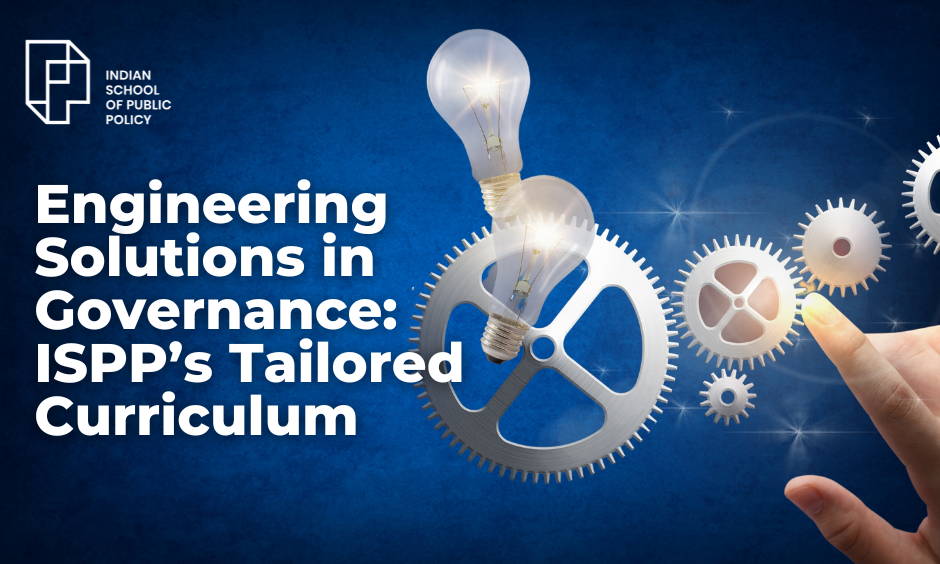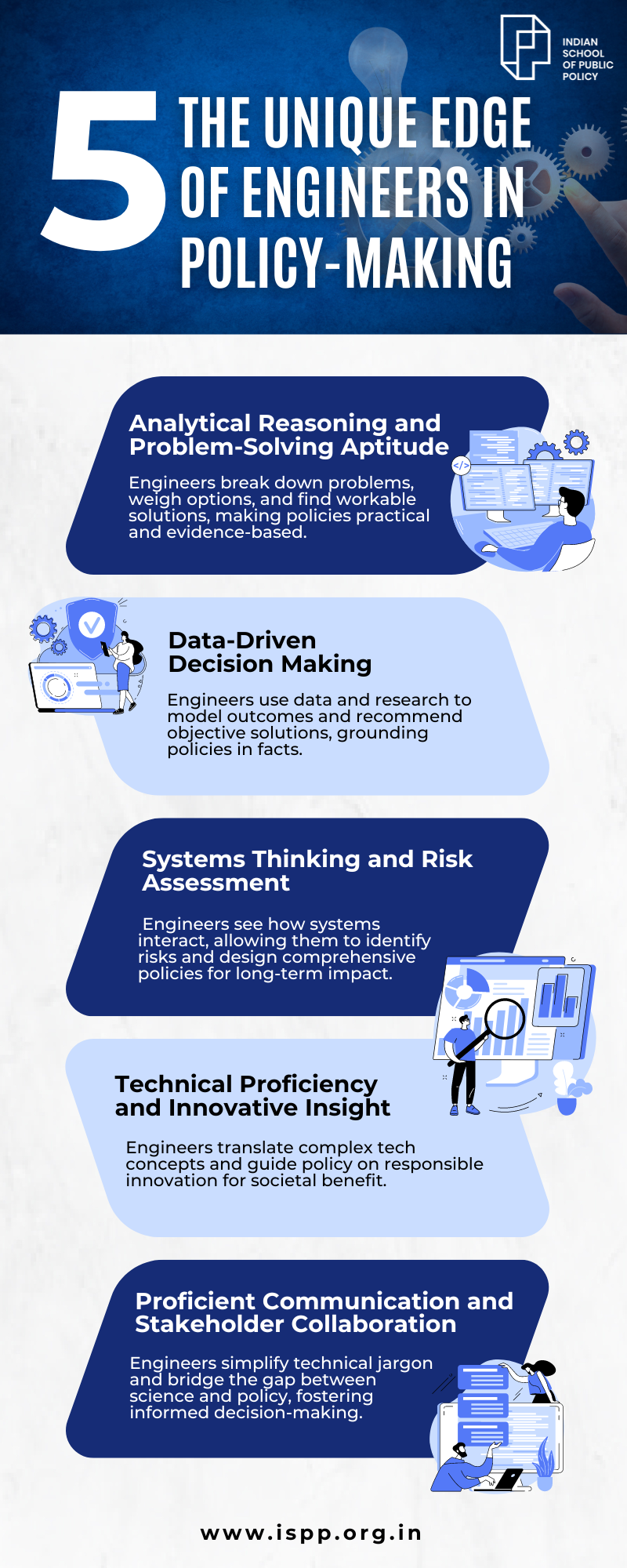
Engineering Solutions in Governance: ISPP’s Tailored Curriculum

The rapidly evolving technological landscape | Engineers contributing to public policy solutions | MPP vs PGP | The Post Graduate Programme in Public Policy (PGP) | FAQs
In an era where technology constantly reshapes our landscape, policymakers are in dire need of precise insights to handle sophisticated challenges. Engineers, with their sharp analytical minds and strong problem-solving skills, are becoming pivotal in sculpting effective public policies.
The Unique Edge of Engineers in Policy-Making
Engineers stand out in the policy arena due to their ability to understand and solve complex problems with ease. They bring a suite of skills that significantly elevate the policy-making process:
🔷Analytical Reasoning and Problem-Solving Aptitude
Engineers are adept at critical thinking and methodically addressing challenges. Leveraging robust analytical skills, they dissect intricate problems, weigh various factors, and devise optimal solutions. In policymaking, engineers employ these abilities to ensure decisions are pragmatic, coherent and grounded in evidence.
🔷Data-Driven Decision Making
Engineers excel in evidence-based decision-making, relying on empirical data and scientific methodologies. Proficient in research and analysis, engineers can model policy impacts, assess alternatives, and offer objective recommendations. By grounding policies in data, engineers enhance their effectiveness and responsiveness to societal demands.
🔷Systems Thinking and Risk Assessment
Engineers excel in systems thinking, understanding the complex interconnections within environments. This holistic view is crucial for formulating policies with broad sectoral impacts. They adeptly evaluate trade-offs, identify risks, and predict unintended consequences, enhancing policy coherence. With a focus on long-term sustainability, engineers help develop comprehensive, robust policies that tackle interconnected challenges effectively.
🔷Technical Proficiency and Innovative Insight
In a technology-driven era, engineers bring essential technical expertise to policy development. Their skill in decoding and conveying technical concepts helps shape evidence-based policies that meet societal needs. With a deep understanding of emerging technologies, engineers foresee the impact on innovation and progress. They are key in crafting policies that promote ethical practices, data security, and technological advancement, enhancing societal welfare and economic growth.
🔷Proficient Communication and Stakeholder Collaboration
In the realm of policy, effective communication and collaboration are paramount. Engineers excel at simplifying technical jargon, fostering dialogue across diverse fields, and connecting science with policy. Their skill in articulating complex ideas to policymakers and stakeholders ensures a comprehensive understanding of critical issues.
Engaging engineers in policy development not only enhances the effectiveness of policies but also ensures they are efficiently implemented, driving societal progress and sustainability. If you are also interested in a career in public policy, you require formal training and subsequently a formal degree.
Navigating Career Paths in Public Policy
Crafting impactful policies demands a thorough analysis of diverse options, drawing from existing evidence. Skilled policymakers are essential for designing and efficiently implementing effective public policies to benefit society.
For those looking to forge a career in public policy, understanding the educational pathways is key. In India, now is the perfect time to pursue a career in public policy.
A public policy aspirant has two prominent choices –
A Master’s in Public Policy VS a Post Graduate Programme in Public Policy (PGP)
Master’s in Public Policy (MPP) programme focuses on government policies and their societal impacts. It aims to provide a strong foundation for policy analysis, implementation, and evaluation. Graduates pursue careers in government, nonprofits, and international organisations.
Meanwhile, a Post Graduate Programme in Public Policy (PGP) in India equips students with policy-making and implementation skills. It’s designed for those aspiring to work in various sectors engaging with public policy. The curriculum covers economics, political science, law, and more, emphasising analytical skills and research methodology. Graduates are prepared to evaluate policy issues and design evidence-based solutions. When choosing a programme, consider factors like admission requirements and career prospects.
And with that, we have a winner!!
Spotlight on the Post Graduate Programme in Public Policy at ISPP
The Post Graduate Programme in Public Policy (PGP) at the Indian School of Public Policy (ISPP) is a prestigious and comprehensive initiative. The programme is meticulously crafted, blending essential knowledge with practical skills to nurture future policy professionals ready to make impactful contributions in government, civil society, or the private sector.
Academics
| Crafted to hone skills, instill ethics, and foster leadership, our programme is a blend of theory and practice. It integrates classroom learning with skill development, hands-on application, and leadership training. The curriculum includes foundational, core, and supporting courses to provide a comprehensive learning experience. |
Register your Interest to Study at ISPP
Infographics:

FAQS
Why are engineers considered valuable contributors to public policy development?
Engineers possess critical thinking skills and analytical abilities crucial for addressing complex challenges in policy-making. Their technical expertise enables evidence-based decision-making and fosters innovative solutions to societal issues.
How do engineers apply their skills in policy-making?
Engineers utilise analytical reasoning to dissect problems, data-driven approaches to make evidence-based decisions, and systems thinking to assess risks comprehensively. Their technical proficiency enables them to address policy challenges effectively.
What role do communication skills play in engineering’s involvement in policy-making?
Effective communication is essential for engineers to convey technical concepts to policymakers and stakeholders. Engineers excel at simplifying complex ideas, fostering collaboration, and bridging the gap between science and policy.
What are the key differences between a Master’s in Public Policy (MPP) and a Post Graduate Programme in Public Policy (PGP)?
While both programmes focus on policy analysis and implementation, an MPP emphasises government policies’ societal impacts and is suitable for careers in government and nonprofits. A PGP in Public Policy equips students with skills for various sectors engaging with public policy, emphasising analytical skills, and research methodology.
Why is now a good time to pursue a career in public policy in India?
With rapid technological advancements and societal changes, there is an increasing demand for skilled policymakers. Pursuing a career in public policy allows individuals to contribute to shaping a more sustainable and equitable future for society.


